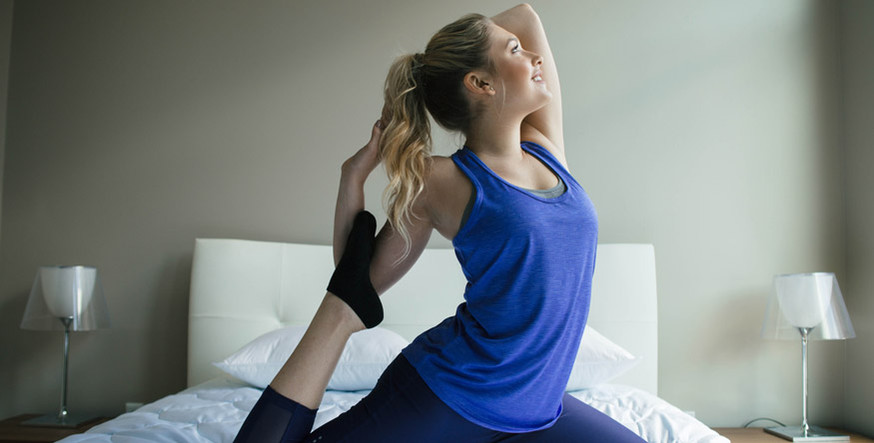Posted by Aline Martin O'Brien on May 20, 2021
Run Faster, Jump Higher … Sleep More?
Sleep is the best athletic performance optimizer there is and has become the cornerstone of recovery and training for professional athletes. We all love a warm comforter and comfy pillow, but what’s the story behind the headline?
High-performance athletes have a new goal in their training and preparation routine: sleep more and better than their competitors. More and more scientific studies are reporting the benefits of sleep for professional athletes, and specialists are hoping that society as a whole reassesses its relationship with the soft pillow.
The fact that better sleep has an effect on physical recovery and performance for athletes is hardly surprising. As with the working population in general, a very large number of athletes suffer from a sleep deficit. And those who do manage to spend more time under the blanket have a significant advantage in sports, not only in games where there is a fine line between victory and loss, but also in the longevity of their personal careers.
Serving as powerful examples, the two most famous athletes in North American sport, basketball player Lebron James and footballer Tom Brady, are fans of the long night's sleep. These two athletes, whose longevity and performance in their sports is almost unprecedented, do not hesitate to explain that they sleep at least 9 or 10 hours a night.
By way of additional illustration, a study carried out among NBA players in 2019 noted that players who posted on the social network Twitter between 11 p.m. and 7 a.m. the day before a game scored on average one point lower per game, and saw their shooting percentage drop by almost 2%. So in a very close game, which is often the case, the sleep of the players can influence the outcome.
This approach is in stark contrast to the general idea of a hyper-competitive North American civilization, which spawned the famous phrase, “You snooze, you lose.” The thinking now is that sleep should be an integral part of any training regimen, and there are a variety of new products to track the user’s daily strain, sleep, and recovery.
Sleep isn't just about physical or muscular recovery. During sleep, our brain reinforces the learning of the day, including motor learning, and makes room for the next day’s lessons. This is essential for athletes, as it allows consolidation of movement, training, and physical exercise at the cerebral level.
In addition, scientific studies have observed that the times of the day - when an athlete peaks in performance - follows cycles roughly the same as the circadian rhythm. For a majority of athletes, the peak performance time occurs in the late afternoon and early evening.
What is therefore complicated for top athletes is to manage the “simple” task of sleeping - during international competitions, when they travel between the west coast and the east coast, when they have to switch from day games to night games, etc. This is because the body's biological clock takes time to adjust to each of these disruptions. Now imagine that six months of your life was traveling from hotel to hotel, changing time zones and game times, competing against the best in the world - who wouldn’t appreciate luxury hotel bedding (such as a Cloud Top Ultra Plush Pillow Top Feather Bed, or a hotel pillow or hotel comforter) waiting for them at the end of the day?
The sports phenomenon called the “home field advantage” is really the “traveling team disadvantage,” as was proven in 2020 when players in the National Hockey League and National Basketball Association competed in a controlled, non-traveling environment. They saw the impact of less geographic travel and consistent sleep on their performance, nearly eliminating the home-field advantage.
Finally, a2021 Australian study analyzed the impact of the Covid 19 pandemic on more than 600 athletes. According to this study, the pandemic disrupted the sleep patterns of athletes, as it has for the general population, but during the stay-at-home order, athletes were able to both train at a high level and follow their natural circadian rhythms, thus developing a consistent sleep pattern. Unfortunately, like many during the pandemic, these same athletes exercised less, spent less time in outdoor light, increased screen time, and reported more anxiety and stress.
The motto of the International Olympic Committee is "Citius, Altius, Fortius," which is Latin for faster, higher, stronger. In this delayed Olympic year, and to reinforce that we all need a good sleep, perhaps it should be amended to, “Citius, altius, fortius, cum auxilium a bonum somno,” i.e., “Faster, higher, stronger, with the help of good sleep.”
At Downlite we are ready to help everyone achieve their best sleep, whether you are an accomplished athlete or an overscheduled parent, so contact us for personal assistance with all of your luxury bedding questions.
More sources:
https://www.espn.com/nba/story/_/id/27767289/dirty-little-secret-everybody-knows-about





